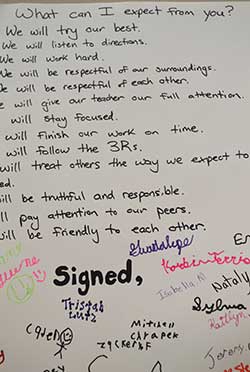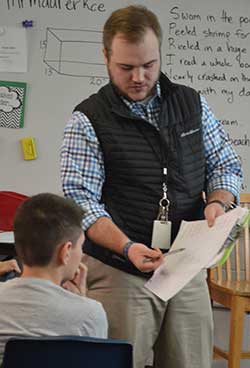Imagine what it would be like to keep up to thirty 5-year-olds under control without a lot of knowledge on how to manage such a group. Then imagine you’re also a new teacher.
Enter New Teacher Network (formerly The Learning Academy), a Kent ISD professional development program started in 2013 that brings together new teachers for lectures, simulated classes and observing master teachers to help them be more successful in the classroom.
Fourteen Kent ISD districts currently send teachers to New Teacher Network Some districts run their own programs, but working with Kent ISD is more cost-effective, says Andrew Steinman, educational technology consultant. “We know there are more new teachers than we’re reaching,” he says.
New Teacher Network is divided into first-, second- and third-year groups and has about 50 teachers participating. It will “graduate” its first class of teachers who have been through the entire three-year program this year.

“It’s important we have this,” Steinman says. “They come out of college and aren’t totally prepared to walk into a classroom and teach. There’s so much to learn, and you can’t do it in four years.”
Bryce Maurer, a first-year, fifth-grade teacher at Kent City Community Schools, says the network “feels like a college course, but instead of textbooks and homework, your job is to bring experiences and tips.”
Besides providing support for new teachers, it’s hoped the professional development will help convince them to stick with the profession. Statistics show 40 to 50 percent of new teachers leave the profession after five years, Steinman said.
“I would say that (many) new teachers ‘throw in the towel’ because they get overwhelmed with the expectations and responsibilities related to teaching,” Steinman says. “The academy provides them with a supportive network that helps them to develop their capabilities to meet the challenges related to their expectation and responsibilities as a classroom teacher.”
Only three years into the five-year outlook, it’s too early to tell the academy’s effect on retention rates, but “it’s looking promising,” Steinman said.
Support = Retain
The camaraderie teachers develop through the academy is seen as a one of the most valuable pieces. “When I try something and it fails, I share that failure and what I learned,” Maurer says. “When I try something new and it works, I get to share that success with the rest of the group. We all help each other to become better.”
Kenowa Hills teacher Kelsey Rendon agrees. “The network helped by providing me with peers who were struggling through the same challenges,” she says. “We were able to talk about these topics, have conversations about what has worked and not worked in our classrooms, and brainstorm solutions.”
She says she also gained a lot from learning labs. “The opportunity to observe master teachers and also have master teachers observe me has been the best way for new ideas and constructive feedback,” says Rendon, who is in her third year of teaching at Kenowa. She graduated from Grand Valley State University with an elementary education degree majoring in mathematics. The first year she taught kindergarten, and the last two years she’s been teaching in the district’s Young Fives program.
Maurer says his biggest challenge is creating a classroom culture. “No classes can teach you exactly how to do that because you have to create a culture with the personalities in your room,” he says. “Another challenge is once you have a culture, how do you maintain it and keep kids accountable for the rules and expectations you have agreed upon?”

The network is aimed at first- and second-year teachers, but also is open to experienced teachers who want to learn new strategies. The first year of the network — which meets eight times a year — focuses on classroom management. That’s the area new teachers say is their biggest problem and want to learn about the most.
The New Teacher Network also encourages the use of more inviting ways to teach, such as project-based learning that encourages more than one learning style, Steinman says.
He gives the example of a math class: A teacher asks for the answer, student raises his or her hand and recites the answer — a memorizing way of learning. But that style of learning, without any explanation of how the answer was arrived at, doesn’t help the student who doesn’t know the answer, Steinman explains, since the process of coming to the answer is not explained.
“There are multiple ways students can solve a problem,” Steinman says. “We want to dive into those ways. If they just did memorizing, that is not going to help them work. They need visible thinking.”
The biggest lessons academy members learn come frequently from sharing ideas with fellow teachers.
“It is such a relief to know that other people are going through the same things as you are,” Maurer says. “The instructors have really made a point to teach us how to deal with tons of behavior issues in our classrooms, sometimes through simulations, sometimes through anecdotes and sometimes through reading articles.
“I always walk out of the sessions with newfound knowledge and excitement to try new things in my classroom.”
CONNECT
Blog: You Can Hear Your Students, But Do You Listen?









